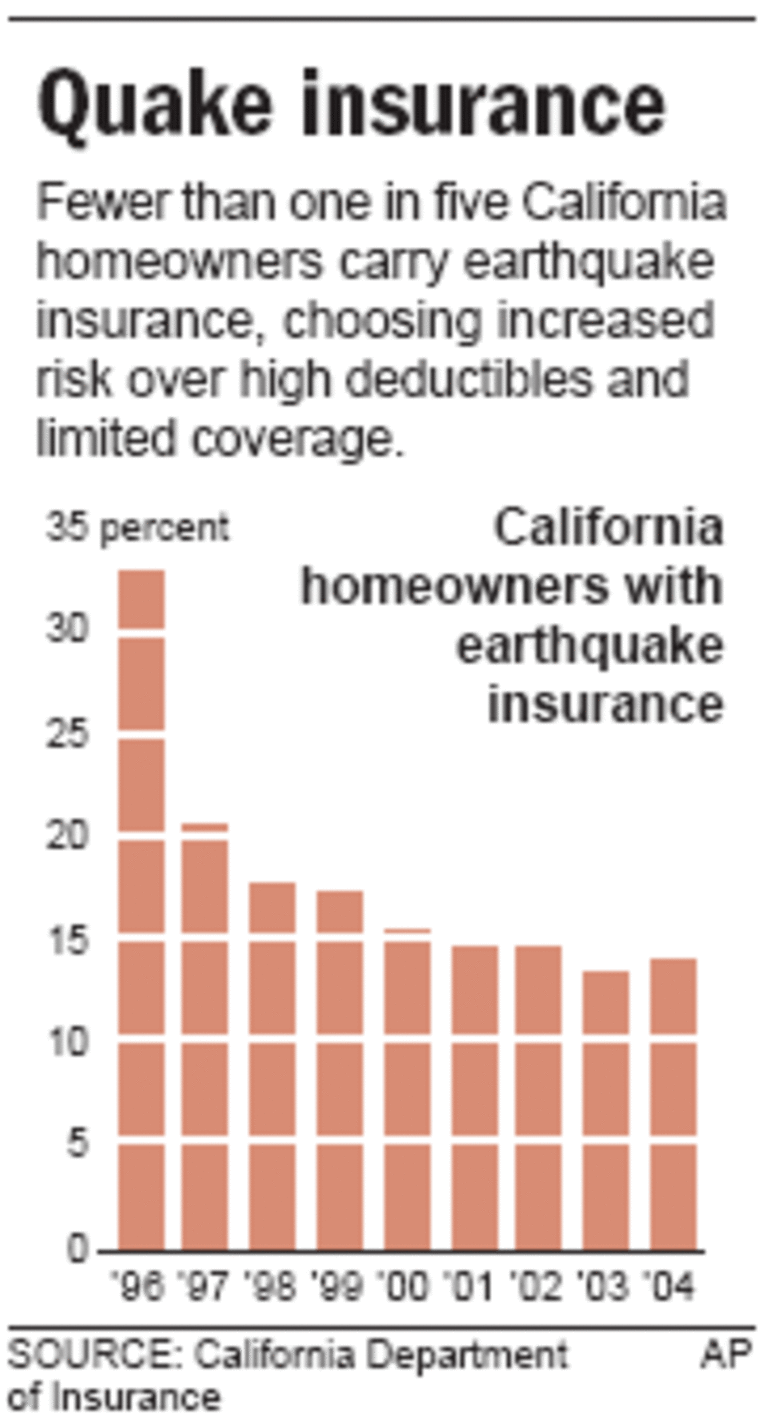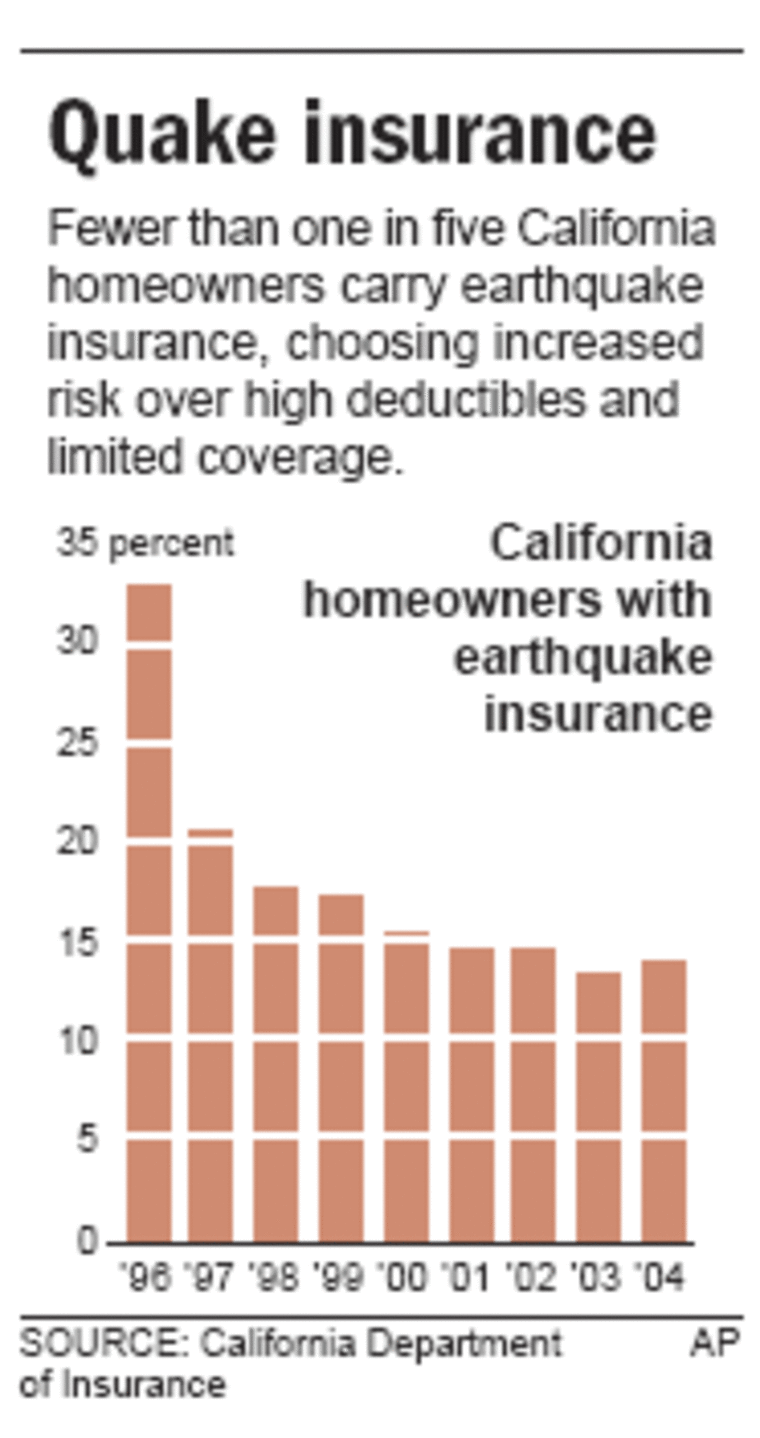When Charlie Bott got an offer in the mail recently for earthquake insurance, he stared long and hard at the bottom line. Then he threw it away.
“It was way beyond anything you pay for house insurance. Not even in the same league,” said Bott, a nuclear engineer with a baby on the way.
Now, like millions of others, he is hoping that the Big One doesn’t strike, and if it does, that the government will come to the rescue.
Californians have built vast metropolises atop seismic faults, but 86 percent of the state’s homeowners have no quake insurance, a proportion that has crept upward as memories of past quakes fade. The number of uninsured was about 65 percent in 1996.
“It’s a game of Russian roulette,” said Norman Williams, an assistant deputy commissioner at the state Department of Insurance.
Historic catastrophe
State officials are hoping that next month’s 100th anniversary of the 1906 San Francisco earthquake prompts Californians to prepare. That quake and subsequent fires destroyed 28,000 buildings and left 225,000 of the city’s 400,000 residents homeless. Estimates of the death toll range from less than 500 to more than 3,000, making it one of the deadliest natural disasters ever to strike the United States.

In the San Francisco Bay area, where geologists project a 62 percent probability of a magnitude 6.7 or greater earthquake in the next 26 years, Hurricane Katrina has had a dual effect on homeowners.
Some Californians called their insurance agents and signed up for quake coverage. But for many others, the billions of dollars in federal aid pouring into the Gulf Coast merely bolstered a sense that the government would come to the rescue after a big earthquake.
In the insurance industry this mind-set is jokingly known as the “Air Force One Solution” — the notion that the president would surely fly over a disaster zone dropping $100 bills from his plane.
“Good luck with that,” said Nancy Kincaid, director of public policy, mitigation and communications for the California Earthquake Authority. The CEA is the state’s privately funded, publicly managed quake insurance provider; its member companies provide coverage to about 70 percent of Californians who have such protection.
FEMA: Don't count on FEMA
Nicol Andrews, a spokeswoman for the Federal Emergency Management Agency, said FEMA’s job is to get people back on their feet. “It would be a false sense of security to rely on FEMA to rebuild a life the way it was before a disaster,” Andrews said.
The cap on FEMA grants to a single household is $26,200, and on loans, $150,000.
The cost of earthquake insurance varies according to a home’s location, age, type of construction, proximity to faults and the type of land it is built upon — bedrock or landfill, for instance.
One homeowner in Oakland will pay $1,468 this year for $306,000 in coverage for his house, with a deductible of nearly $46,000. A house insured for $500,000 in the Marina district of San Francisco — a neighborhood built on unstable fill from the bay — costs $2,400 a year to insure through the California Earthquake Authority, with a $75,000 deductible.
Costs on top of costs
Many homeowners are already struggling with some of the highest housing prices in the country.

Matthew Park, an information-technology manager who owns a home in Corte Madera, across the Golden Gate Bridge from San Francisco, decided against quake insurance. “The deductible is ridiculously high, to the point where the level of protection you actually receive is anemic,” he said.
“The costs seem not to justify the expense,” said Mike Janover, a marketing official at an Internet company. “My home is on bedrock, as well as the fact the place is 96 years old. If it hung in there this long, I made a bet it can hang in there for another five years before I sell it.”
The CEA’s rates will drop an average of 22 percent in July, in part because of a government study that found the risk of earthquake damage was lower than previously thought in many densely populated areas.
Officials are hoping the rate cut will help reverse the long slide in the number of homeowners with quake insurance.
